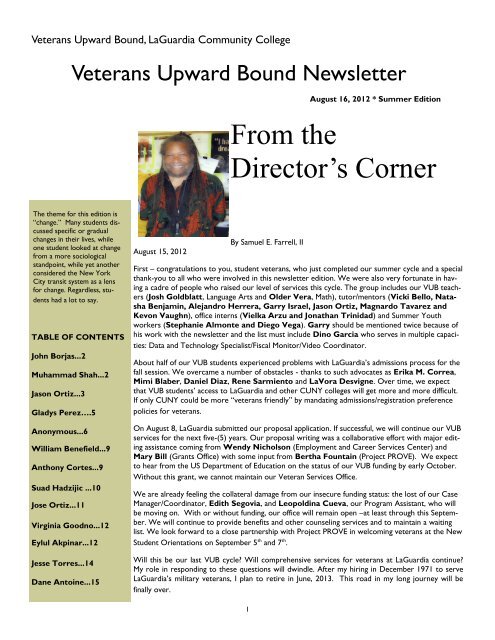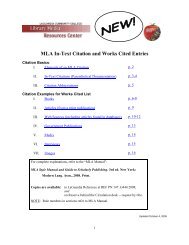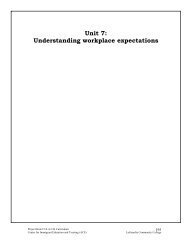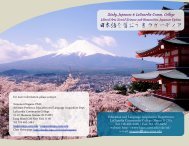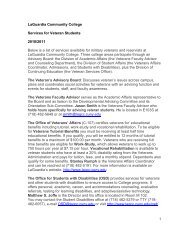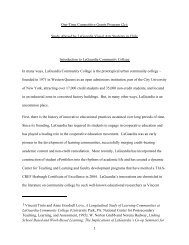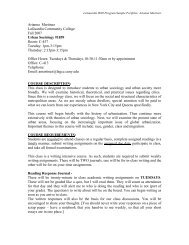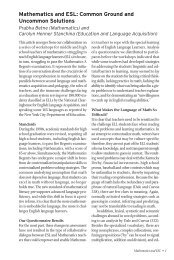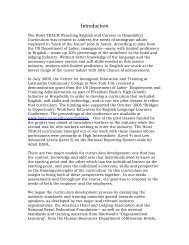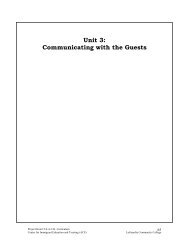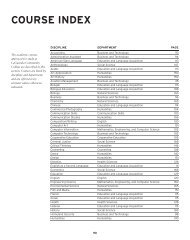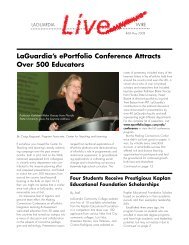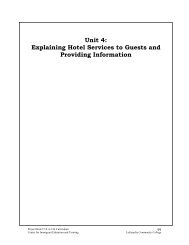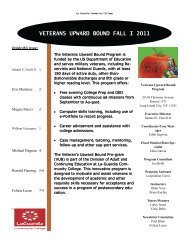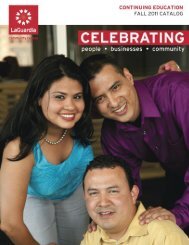Summer 2012 Newsletter - LaGuardia Community College - CUNY
Summer 2012 Newsletter - LaGuardia Community College - CUNY
Summer 2012 Newsletter - LaGuardia Community College - CUNY
Create successful ePaper yourself
Turn your PDF publications into a flip-book with our unique Google optimized e-Paper software.
Veterans Upward Bound, <strong>LaGuardia</strong> <strong>Community</strong> <strong>College</strong><br />
Veterans Upward Bound <strong>Newsletter</strong><br />
August 16, <strong>2012</strong> * <strong>Summer</strong> Edition<br />
From the<br />
Director’s Corner<br />
The theme for this edition is<br />
“change.” Many students discussed<br />
specific or gradual<br />
changes in their lives, while<br />
one student looked at change<br />
from a more sociological<br />
standpoint, while yet another<br />
considered the New York<br />
City transit system as a lens<br />
for change. Regardless, students<br />
had a lot to say.<br />
TABLE OF CONTENTS<br />
John Borjas...2<br />
Muhammad Shah...2<br />
Jason Ortiz...3<br />
Gladys Perez….5<br />
Anonymous...6<br />
William Benefield...9<br />
Anthony Cortes...9<br />
Suad Hadzijic ...10<br />
Jose Ortiz...11<br />
Virginia Goodno...12<br />
Eylul Akpinar...12<br />
Jesse Torres...14<br />
Dane Antoine...15<br />
August 15, <strong>2012</strong><br />
By Samuel E. Farrell, II<br />
First – congratulations to you, student veterans, who just completed our summer cycle and a special<br />
thank-you to all who were involved in this newsletter edition. We were also very fortunate in having<br />
a cadre of people who raised our level of services this cycle. The group includes our VUB teachers<br />
(Josh Goldblatt, Language Arts and Older Vera, Math), tutor/mentors (Vicki Bello, Natasha<br />
Benjamin, Alejandro Herrera, Garry Israel, Jason Ortiz, Magnardo Tavarez and<br />
Kevon Vaughn), office interns (Vielka Arzu and Jonathan Trinidad) and <strong>Summer</strong> Youth<br />
workers (Stephanie Almonte and Diego Vega). Garry should be mentioned twice because of<br />
his work with the newsletter and the list must include Dino Garcia who serves in multiple capacities:<br />
Data and Technology Specialist/Fiscal Monitor/Video Coordinator.<br />
About half of our VUB students experienced problems with <strong>LaGuardia</strong>’s admissions process for the<br />
fall session. We overcame a number of obstacles - thanks to such advocates as Erika M. Correa,<br />
Mimi Blaber, Daniel Diaz, Rene Sarmiento and LaVora Desvigne. Over time, we expect<br />
that VUB students’ access to <strong>LaGuardia</strong> and other <strong>CUNY</strong> colleges will get more and more difficult.<br />
If only <strong>CUNY</strong> could be more “veterans friendly” by mandating admissions/registration preference<br />
policies for veterans.<br />
On August 8, <strong>LaGuardia</strong> submitted our proposal application. If successful, we will continue our VUB<br />
services for the next five-(5) years. Our proposal writing was a collaborative effort with major editing<br />
assistance coming from Wendy Nicholson (Employment and Career Services Center) and<br />
Mary Bill (Grants Office) with some input from Bertha Fountain (Project PROVE). We expect<br />
to hear from the US Department of Education on the status of our VUB funding by early October.<br />
Without this grant, we cannot maintain our Veteran Services Office.<br />
We are already feeling the collateral damage from our insecure funding status: the lost of our Case<br />
Manager/Coordinator, Edith Segovia, and Leopoldina Cueva, our Program Assistant, who will<br />
be moving on. With or without funding, our office will remain open –at least through this September.<br />
We will continue to provide benefits and other counseling services and to maintain a waiting<br />
list. We look forward to a close partnership with Project PROVE in welcoming veterans at the New<br />
Student Orientations on September 5 th and 7 th .<br />
Will this be our last VUB cycle? Will comprehensive services for veterans at <strong>LaGuardia</strong> continue?<br />
My role in responding to these questions will dwindle. After my hiring in December 1971 to serve<br />
<strong>LaGuardia</strong>’s military veterans, I plan to retire in June, 2013. This road in my long journey will be<br />
finally over.<br />
1
“Love, School, and Experience”<br />
John Michael D. Borja<br />
It is called the city that never sleeps. Public transportation is open 24 hours. The City has a population<br />
of 8 million and counting, with 36% of its current population born outside the United States. It<br />
has one of the lowest crime rates of U.S. cities and is the safest city overall. It was the fashion capital<br />
of the world (thanks to the recession, it no longer is.) From hot dogs to pirated DVDs, thousands<br />
of vendors grace its streets. Its nickname is “The Big Apple”, New York City. No other city can<br />
compare. Recently discharged from military service, in the summer of <strong>2012</strong>, I loaded the U-haul<br />
truck and drove to New York City for love, school, and experience.<br />
I met her while I was stationed in Las Vegas, Nevada in the summer of 2009. She was from New<br />
York City. It was just another weekend, another party, and another new face. I wouldn’t call it love<br />
at first sight. We laid eyes on each other and being the courageous man that I am, I walked up to<br />
her and simply asked for her name. We had an exciting conversation and realized how much we had<br />
in common. I, of course, asked to see her again. The party ended, and even though she was moving<br />
back to NYC two weeks later, we knew we had a connection. We took a chance and created a long<br />
distance relationship. Three years later we were still together.<br />
I graduated from John F. Kennedy, class of 2007, in Guam, USA. Ever since high school I wanted to<br />
get into the medical field. To pay for college and to serve my country, I decided to enlist in the U.S.<br />
Air Force as a medical technician. After being discharged from the military, I had three places where<br />
I could attend college. The first was to stay in Las Vegas, NV. The second was with my girlfriend in<br />
New York City. Lastly, I could go back home to Guam. I needed a refresher course to get into college<br />
without taking remedial classes. All the knowledge I had been taught in high school had diminished.<br />
Basic math problems and even thinking of the structure of an essay had proven to be a challenge.<br />
I needed to find the right school with a program that I could benefit from in a short time. I<br />
found the <strong>LaGuardia</strong> <strong>Community</strong> <strong>College</strong> Veteran Upward Bound program. It was the perfect fit. I<br />
couldn’t qualify for Upward Bound programs in colleges in Las Vegas and Guam. Worse, a course<br />
like this would cost hundreds of dollars. I did more research and found <strong>LaGuardia</strong> had the classes I<br />
needed for the career that I wanted. It’s a win-win.<br />
Welcome to the small island in the middle of the pacific, Guam, the place where I grew up. The perfect<br />
picture of paradise, tropical weather year round, ocean the color of blue skies, half an hour<br />
drive to white sand beaches, and a “chill” attitude way of life. Why trade a “chill” way of life for<br />
New York City? Growing up, I was very sheltered. I was always told to come home at a very early<br />
time, I would even be home to practice penmanship, and I was not allowed to participate in pretty<br />
much anything unless chores were accomplished daily. I always wanted to live life to the fullest. I<br />
wanted to experience and see different cultures and different lifestyles. With the love of my life and<br />
school in place in NYC, it all made sense.<br />
In conclusion, I moved to the great city of New York for love, school, and experience. I moved to<br />
NYC in the end of the may, <strong>2012</strong>. My girlfriend and I took a road trip on a little over 2,500 miles<br />
drive from Las Vegas to New York City, which took about five days. It was my first and longest road<br />
trip. My relationship continues to be going strong, along with its ups and downs. (What relationship<br />
doesn’t.) I have been accepted to <strong>LaGuardia</strong> as a freshman and awaiting to start the fall semester. So<br />
far, I see life in NY as “straight to business” and I am quite enjoying the rush.<br />
Muhammad Shah<br />
I still remember when someone asked me in high school what I wanted to be: I replied “dentist.” But<br />
due to my family`s economic condition I took maritime studies, became Chief Mate in the merchant<br />
marines and moved all across the world. Meanwhile, I completed a master in Information Technology.<br />
I also worked as a software designer. I always say that working on shore is far better than working<br />
off shore.<br />
I began to reconsider my life's course when my grandmother succumbed to the grips of renal failure.<br />
Usually I was with her at the dialysis center. I felt powerless by my inability to alleviate her suffering<br />
2
so I aggressively researched her condition to understand its cause. I became increasingly fascinated<br />
with the medical literature I had been exploring. The health-affirming, regulatory mechanisms between<br />
organ systems reminded me of the cooperative algorithmic relationships essential to the<br />
functioning of computer software. My grandmother ultimately passed away, but this loss personalized<br />
my developing interest in medicine. Over time, the fascination I derived from the study of living<br />
beings outweighed my prior interest in manipulating inanimate software. I`m determined to help<br />
out my friends and family members in a better way and don’t want to feel again that I am in a state<br />
of powerlessness.<br />
My father had already spent a lot of his money to build up my career in the computer engineering<br />
field and so I decided to make my life in medicine using my own money. I talked to different recruiters<br />
from different branches of the military but only Navy recruiter James Kawne showed me<br />
the way to get on the path in the field of medicine. I joined the military as a hospital corpsman dental<br />
assistant. The best thing in my life happened when I took an oath to solemnly serve the country<br />
in the United States Navy as a military hospital corpsman. The Star-Spangled Banner has given me a<br />
lot of respect across the world. Now this is the time to pay back that trust. The navy gave me a<br />
great opportunity and a new way of life. I can start a Postbaccalaureate program by the Montgomery<br />
GI Bill; when I will get admission in a dental college they will start a stipend for 48 months along<br />
with full college tuition.<br />
While in military training I tested my aptitude for medical study in the classroom. I completed an<br />
intensive Hospital corpsman (EMT, nursing) and dental assistant course. Armed with a clear sense<br />
of purpose and maturity, I now had the academic confidence to be a more focused and improved<br />
student than I had been in college years ago. Indeed, superior study habits and passion for the material<br />
propelled me to the top 10% of my EMT class and a superior performance in the Navy Dental<br />
Assistant Program. My path now leads in one direction, and I go forth resolute and self-assured.<br />
My initial ventures into a computer science career underscored my affinity for scientific reasoning,<br />
but a firsthand exploration of a physician's work have taught me how to apply such reasoning to<br />
directly benefit the lives and wellness of human beings. Although I haven't taken a traditional route<br />
to medicine, I consider every twist and turn of my life's post-collegiate course a funnel. This journey<br />
has matured me with a well-rounded perspective of my inner motivations that now fuels a<br />
strong work ethic. I am confident that I have the intellectual potential, intention, focus, and readiness<br />
to commit my life to medicine. Endurance and tenacity power the inertia to overcome the<br />
future challenges of medical school, while passion and dedication energize the gravity accelerating<br />
me toward my goal. I ask for the education – the tools – to empower me with the knowledge and<br />
skill-set necessary to use my life toward the betterment of others.<br />
Jason Ortiz<br />
Every person goes through some type of change in his or her life, whether it<br />
is through a certain age being attained, life being birthed, death being<br />
wrought, or a number of different things. I am no exception to this. I have<br />
not had what would be called a steady and good life thus far. I have had to<br />
go through many changes, some good, and some bad. Overall, despite the<br />
events that unfurled, how I changed to become who I am now is better than<br />
what could have possibly been in a different life had I allowed some events<br />
to fully engulf me.<br />
I initially had a normal life (or at least what I perceived as normal at the<br />
time) and knew of nothing wrong going on. Upon my sixth birthday passing, I<br />
thought I was older so I wouldn’t go to sleep when I was supposed to. Most kids do that for whatever<br />
reason anyway. Upon sneaking out of my room, I saw something that changed how I saw everything.<br />
What I saw was what I would call now “the truth behind the scenes.” What it was I will not<br />
say, but regardless, for the rest of my “childhood,” I had to be wary of my father, whom I harbor a<br />
deep hatred for to this day. Further into my childhood, at age nine to be exact, I had the unfortunate<br />
event of going into foster care . Upon choking back any strong emotions I had about leaving, I<br />
came to reality that now I had to be the protector of my sisters through these hard times. Months<br />
after that, we were taken in by our grandmother, and I feel as if we would have fared better with<br />
3
our previous foster family. I despise in many ways my supposed “childhood” and wish it was different.<br />
I had changed from a completely innocent boy to carrying the weight of responsibility<br />
onto my young shoulders. Those changes prevented me from being susceptible to most other<br />
negative influential changes like joining a gang or doing drugs. Other than few good memories, I<br />
remember playing Sonic the Hedgehog and only then did I actually feel like a kid. I became fond<br />
of him and it became my outlet for stress. Fast forwarding from there I came to my teen years.<br />
Upon entering my teenage years, I was met with a multitude of events which led to not only<br />
changes within myself, but also the change of my surroundings. I left my grandmother’s and was<br />
reunited with my mother. Although it was a much wanted reunion, the ensuing events deemed<br />
to be not so wanted. Upon living with my mother, not only did I need to change my school once<br />
more, but also the area we were living in was a lot less favorable than the one I departed. Upon<br />
my first night there, I awoke to gun shots outside. I learned to get used to them quickly. The<br />
school I was to attend was a good school, but the students were under different influences. This<br />
included, but was not limited to, drugs, gangs, sex, violence, and some instances of racism. I<br />
adapted quickly to these surroundings as well. I slowly began to change into something I wasn’t. I<br />
attained the nickname “quick fingers” because there wasn’t anything I couldn’t steal whether it<br />
was in a store, or right in front of someone’s eyes. Through the many fights I was involved in<br />
(almost all of them in self-defense), I also carried over my nickname from my previous school,<br />
“Grim”. I was changing in a negative way and quickly. I then met a person and was going to lift<br />
something. I was cocky and knew it was easy, but another person ratted me out. I was caught,<br />
but they let me go with no charges. I was taught a lesson and was able to reflect. I no longer<br />
wanted to live like that. I stopped ‘lifting’ things and became more passive in terms of fighting,<br />
but in that environment, they see that as weakness. Around that time my mother was also diagnosed<br />
with breast cancer. I went into a yearlong depression upon finding out. It got to the point<br />
where the few ‘emo’ kids kept away from me because, from what they said, I was “too emo” for<br />
them. I slowly withdrew myself from people and even withdrew from light or anything that wasn’t<br />
dark and cold. I found strength in solitude and complete silence. I found a slightly odd comfort<br />
from the cold, uncaring darkness. When the chemo was successful and the doctors said<br />
there was no more traces of the cancer anymore, it was relieving, but I was still cold, lost and<br />
withdrawn. I slowly worked out of that and came to be close to what I once was, but I had<br />
changed much too drastically for that. Near the end of my teen years to the beginning of my<br />
adult years were the next, and possibly the biggest, changes to my life.<br />
Upon my sixteenth birthday, I was still trying to get used to life, for lack of a better word. School<br />
had become troublesome because of the other students. I was really good in English, math and<br />
even better in science. It was to the point where I would only go in during test days, take the,<br />
and pass with extra credit if possible. The problem was actually with the school I was in. It is a<br />
school that has been in the news before for violence. That was one of many reasons I kept cutting<br />
classes. When nearing my eighteenth birthday, a day came where I walked out of my English<br />
class and was in the middle of two pistols, one held by a ‘blood’, the other held by a ‘crip’, both<br />
aiming at each other and me in the middle: I knew I couldn’t stay in that school. I proceeded in<br />
getting my GED after my eighteenth birthday to actually have some type of education diploma<br />
under my belt. Upon completion of that, I was working odd jobs for about a year. During this<br />
time, I was also dating someone (her significance comes in after I get my GED). I worked odd<br />
jobs and I was with her for a total of 4 years. I really did care about her. I was a responsible person<br />
and knew when I needed to take responsibility for my actions. She ended up saying she was<br />
pregnant. I knew I couldn’t support a family on odd jobs, and I barely had any work experience<br />
as well. I had wanted to join the military for quite a while, so I decided it was the best course of<br />
action. I chose the Marine Corps because of my late Uncle Nelson. It was also the hardest<br />
branch of service in terms of training. No one said I could do it, and I wanted to prove them<br />
wrong. This was going to prove to be one of the biggest changes of my life. A month after my<br />
nineteenth birthday I was slated to be shipped out to basic training. I knew what I needed to do,<br />
I was prepared as best I could be, and my mind was set in stone. Unlike everyone else, I didn’t<br />
have a mother and father to see me off. Instead, my uncle and his wife saw me swear in and saw<br />
me off instead. The travel was long and added to the stress that was growing by the second. Diving<br />
into the unknown abyss is what it felt like. Upon arrival to the base, everyone with me started<br />
having second thoughts about their decision. I really do mean everyone who was in that bus<br />
other than the bus driver. I, on the other hand, had complete determination. I was a very skinny<br />
4
person and could have been perceived as the weakest there, and yet mentally I was the strongest.<br />
Upon being introduced to our Drill Instructors, everyone in the platoon was caught off<br />
guard. It was like culture shock on steroids. I kept my cool because in reality, I been through a<br />
lot of situations like this.<br />
Unlike the other recruits, I started seeing the positives that we were getting three square meals<br />
a day; we were getting to shower every day; we were learning military tactics; we were exercising<br />
often; we had full medical benefits given to us; we were getting paid for it all. I had gotten<br />
used to the yelling really quick as well. I went from being skinny beyond all reason to being huge<br />
and muscular. It was an uplifting experience for me! I had the strength I wanted and I had everything<br />
I needed to provide for a family and to better myself! I went from being poor; skinny; and<br />
weak; to being having a bank account and being financially stable; muscular; and strong! I felt that<br />
I had changed for the better not just financially, but physically and mentally as well. I saw what I<br />
had been given and had planned on not ruining this opportunity given to me.<br />
Not everything was good, however. I planned on getting married and being a father. The girl I<br />
was with lied about the first pregnancy and then a whole sequence of events came forth where<br />
she was pregnant with twins, and I was actually prepared to be a father. Unfortunately, nothing<br />
can ever be perfect, so I found out she was doing drugs and drinking, thus she lost them. After<br />
much other drama where her family still speaks to me, but disowned her for the many screw ups<br />
she had done, the big reason I joined was no longer a factor to me. I had to move on and keep<br />
the positive flow going on everything else. I changed though in not trusting women while I was in<br />
the military. Many said they would wait, but as soon as training or something else would happen,<br />
they were with another guy. I refused to be played again. Regardless, I then concentrated on my<br />
Marine Corps career and worked my ass off to attain Corporal and upon doing so, I was given a<br />
Sergeant’s billet and was in charge of an entire platoon. I was at the top of my game. I was in<br />
great physical shape, great in completing tasks given to me, great in managing Marines. I really<br />
was feeling amazing! Time passed and then came the time to re-enlist or EAS. I weighed my options.<br />
I was tempted to stay. Everything I could want or need was there. My Staff Sergeant who<br />
was going to be promoted to Gunnery Sergeant soon was my mentor to being a better Non-<br />
Commissioned Officer, and was going to see me pick up Sergeant. I weighed my options, but<br />
ultimately chose to EAS with the hopes of another huge change for the better by going through<br />
college.<br />
There have been many different things to happen to me during my life that I could only write<br />
into a book because that is the only way to keep all the detail in there. Every event had a significant<br />
change to how I thought, how I reacted, and who I was becoming. Regardless of what was<br />
bad and what was good, it all had a hand in what I became. I definitely am grateful I did not become<br />
a usual stereo type of where I was growing up. I had an open mind and planned on using it.<br />
I have had to go through a lot to develop it, but now I know anything could happen at any time,<br />
whether good or bad. The world we live in is consistently changing around us whether we<br />
choose to accept it or not. It is how we change to adapt to it that determines if we improve and<br />
come out on top.<br />
Gladys Perez<br />
Life can be a learning experience. Some people learn from life, others do not. What really<br />
changed my life was when I hit rock bottom. I felt very vulnerable, and was taken for granted. I<br />
was a trustful person. I guess I was naïve thinking that everyone was honest and believed their<br />
stories.<br />
It was February 6, 2001, on a snowy day. I was going to work, suddenly I slipped and fell on ice<br />
and could not get up when I saw my bone out of place I was so surprised the way I reacted. First<br />
I saw a man and a woman coming towards me asking me if I needed an ambulance. I asked the<br />
man to go to my house and carefully tell my father to come over. Then I realized that I was not<br />
going to be able to go to work. As I saw my dad coming over his face was very pale. I asked him<br />
to get me the phone, and a camera. He tried to get what I had asked for but he got so nervous, I<br />
5
guess by seeing his daughter lying on the side walk with her left leg broken. I made the phone call<br />
to the Post Office (as a Letter Carrier) and told my supervisor that I had an accident and would<br />
not be coming in.<br />
I got to the hospital and they took x-rays. The doctor said that I had an open wound fracture.<br />
Then he explained that I broke my fibular and tibia. It took a few days to get surgery. My son<br />
came over from the military on emergency leave to see me. I felt very vulnerable. Being a very<br />
independent person I did not feel good about myself.<br />
Meanwhile, I had been renting my first floor apartment to a lady with her two sons when she<br />
decided not to pay rent. She told me that she was having financial problems. I tried to explain to<br />
her that I was not working because of the accident and needed her income for my mortgage.<br />
This went on for several months until I realized that she was not going to pay the rent. I had to<br />
take her to court. It took a good nine months to get her evicted.<br />
After all this I had to live on credit cards; I was so discouraged. I went to see the doctor on September<br />
2001 thinking that he was going to remove the cast when he told me that I would need<br />
another surgery because my bone shifted. I was so devastated with that news that my dad decided<br />
to leave to Puerto Rico because he felt overwhelmed with what was happening to me. The<br />
doctor performed the other surgery; this time he put two metal plates with 14 screws. It took<br />
me one year and six months to heal from that awful fall.<br />
This experience changed my life by making me more sensitive to disabled and elderly people. It<br />
gives me a different approach on how to see life. Some people take life for granted and others<br />
take advantage of it. In today’s society we need to be careful about who we can trust and not be<br />
naïve because there are lots of wolves.<br />
“That Student” (Anonymous)<br />
The boy scouts taught me how to be an individual, in the Army I developed into a leader, and I<br />
learned how to be a team player from my rugby coach. Unfortunately no one prepared me for<br />
the most challenging and life changing role I am faced with. When it was announced that I was<br />
going to be a parent, a mixture of emotions swept over me. Although the thoughts of having a<br />
"daddy's little girl" or "that’s my boy" moments were so exciting, I struggled with the idea of raising<br />
a child at that current stage in my life; I was practically still raising myself.<br />
Tu Vakarau ena Vei Gauna “Always Prepared” ― Motto of the Fiji Boy Scouts Association<br />
I didn't have the typical 9 to 5 job or was anywhere remotely close to living an American dream.<br />
I was a 25 year old part time soldier who travelled a lot for either training or real world missions.<br />
On the civilian side I worked in the private sector of the security industry as a tactical<br />
firearm instructor, which consisted of its own time consuming agenda. Obviously this was going<br />
to call for some serious time management skills once a child was added to my life's equation, it<br />
became apparent that some serious decision making was going to have to take place. As the<br />
months began to add up pulling the due date closer, like a chain reaction my anxiety levels increased,<br />
pushing me closer to that red panic button. My short and long-term goals, even my routine<br />
day dreams didn't seem practical anymore when I factored in a child; my views on nearly<br />
everything I did or planned to do instantly change. Going forward I would have to consider my<br />
family and how it will impact their lives. Unfortunately because my experiences and skill sets<br />
were very specific, many options of having an alternative lifestyle were not available to me. So<br />
the decision was made to remain in uniform a bit longer, until I figured out a winning game plan. I<br />
was not prepared for this new chapter in my life.<br />
“It is not the strongest of the species that survives, nor the most intelligent, but the<br />
one most responsive to change.” ― Charles Darwin an English Naturalist (1809 -<br />
1882)<br />
Many people will state that they have experienced change in their lives, one way or another due<br />
to a defining moment. I simply like to view change in one’s life as a form of evolutionary adapted-<br />
6
The boy scouts taught me how to be an individual, in the Army I was developed into a leader,<br />
and I learned how to be a team player from my rugby coach. Unfortunately no one prepared me<br />
for the most challenging and life changing role I am faced with. When it was announced that I<br />
was going to be a parent, a mixture of emotions swept over me. Although the thoughts of having<br />
a "daddy's little girl" or "that’s my boy" moments were so exciting, I struggled with the idea of<br />
raising a child at that current stage in my life; I was practically still raising myself.<br />
Tu Vakarau ena Vei Gauna “Always Prepared” ― Motto of the Fiji Boy Scouts Association<br />
I didn't have the typical 9 to 5 job or was anywhere remotely close to living an American dream.<br />
I was a 25 year old part time soldier who travelled a lot for either training or real world missions.<br />
On the civilian side I worked in the private sector of the security industry as a tactical<br />
firearm instructor, which consisted of its own time consuming agenda. Obviously this was going<br />
to call for some serious time management skills once a child was added to my life's equation, it<br />
became apparent that some serious decision making was going to have to take place. As the<br />
months began to add up pulling the due date closer, like a chain reaction my anxiety levels increased,<br />
pushing me closer to that red panic button. My short and long-term goals, even my routine<br />
day dreams didn't seem practical anymore when I factored in a child; my views on nearly<br />
everything I did or planned to do instantly change. Going forward I would have to consider my<br />
family and how it will impact their lives. Unfortunately because my experiences and skill sets<br />
were very specific, many options of having an alternative lifestyle were not available to me. So<br />
the decision was made to remain in uniform a bit longer, until I figured out a winning game plan. I<br />
was not prepared for this new chapter in my life.<br />
“It is not the strongest of the species that survives, nor the most intelligent, but the<br />
one most responsive to change.” ― Charles Darwin an English Naturalist (1809 -<br />
1882)<br />
Many people will state that they have experienced change in their lives, one way or another due<br />
to a defining moment. I simply like to view change in one’s life as a form of evolutionary adaptedness.<br />
The term "evolutionary adaptedness" was coined by John Bowlby (26 February 1907 – 2<br />
September 1990) a British psychologist, psychiatrist and psychoanalyst as part of attachment<br />
theory to human evolution. It refers to the environment to which a particular evolved mechanism<br />
is adapted. Adaptation is the evolutionary process whereby an organism becomes better<br />
able to live in its habitat or habitats. Throughout my entire life as far back as I can remember, I<br />
have been adapting to ever changing environments and circumstances. Starting with growing up<br />
as a child deprived of motherly love and a positive father figure. Than from a teen that surfed<br />
and played rugby for my high school into an adult that represented a country on various expeditionary<br />
missions. These life experiences were strong influences that molded and evolved me into<br />
the person that I am now. Evolutionary adaptation continues to be an ongoing process, which<br />
suggests constant psychological adjustment on my part.<br />
In May of 2000, I became a father of a beautiful little girl named Jadzia (jahd ze ah). Unfortunately<br />
this joyful occasion was quickly followed up with a traumatic turn of events. I received orders to<br />
attend six weeks of training in Key West, Florida and then deploy directly to South of Sudan in<br />
Africa for a six month Foreign Internal Defense Operation. I heard about these types of missions<br />
by senior members so I knew it wasn't going to be a walk in Central Park.<br />
The early years of my daughter's life weren't filled with witnessing her first steps or hearing her<br />
first word. Due to my constant deployments quality time with my daughter consisted of photos,<br />
along with the occasional phone conversation when the opportunity presented itself. It was very<br />
difficult to spend so much time away from her. When home I made every effort to spend the<br />
much needed quality time with her. I wanted to be everything I felt a parent should be. Growing<br />
up I never knew my dad or anyone from his side of the family; all my life I was plague with the<br />
"what if" syndrome. What if he would have stuck around? What if this and what if that? To add<br />
to the growing pains of my childhood, my mother never stuck around much. She had her own<br />
agenda which didn't include being there for my sister and I. Thankfully my grandmother and uncles<br />
were willing to contribute to raising of my younger sister and me. Being in the situation that<br />
I have been since a child, enduring challenges on a daily basis, has molded me into a person that<br />
7
has learned the softer side of perseverance. With all the failures that have occurred in my life,<br />
whenever I succeeded it was as sweet as that first bite of the ripest mango. Throughout the majority<br />
of my life I pushed on past obstacles without fully understanding why I didn't want to give<br />
up; passion may have been the reason from time to time. But with raising a child I found out it<br />
takes more than that, it takes true compassion. A virtue I thought would come naturally, giving<br />
the father-daughter bond. Unfortunately the inner frustrations that I had toward myself had been<br />
like a cancer spreading throughout my life and affected those closest to me. I needed to learn<br />
how to appreciate who I am, and what I have in order to feel confidence and unconditional love<br />
for others; mainly my daughter.<br />
“There are three types of people in the world, those who make things happen, those<br />
who watch things happen and those who wonder what’s happening!” ― Anonymous<br />
Years from now I don't want to wonder what had happened to my daughter and the relationship<br />
that we share. This brings to mind one of the Bruce Willis Die Hard films "Live Free or Die<br />
Hard”. The film displays Bruce Willis as a father along with his estranged daughter. What pulled<br />
me into this particular movie is that throughout the whole film Bruce Willis struggles with his<br />
relationship with his daughter. She grew up to have all of his tough and challenging attributes.<br />
They seem more like twins then father and daughter, bumping heads whenever they were together.<br />
The funny aspect of this relationship is that I wouldn't mind my daughter growing up to<br />
be this tough feminine woman. But on the other hand I don't want to be in Bruce Willis's shoes<br />
where he mostly fights with her, just to make up for the lost time he wasn't able to spend with<br />
her due to work. Now she has sort of rebelled against him and challenges him on everything. On<br />
a daily basis I continue to learn something new about myself and how to be better parent and<br />
person. I steadily collect advice and information from various resources, learn from the mistakes<br />
and experiences of others parents. I always thought that things would be so much easier if there<br />
was some sort of field manual or a How to be A Daddy Book for Dummies, with plenty of illustrative<br />
photos, until I came across a Jim Henson quote where he once said that “Kids don't remember<br />
what you try to teach them. They remember what you are”. Since leaving the military in<br />
2010, I decided to do just that. By adjusting my mentality and allowing my daughter to be a typical<br />
kid, and not prematurely prepping her for the approach of some sort of apocalypse while<br />
most parents are teaching their kids to ride bikes. Allow her to make mistakes without transforming<br />
into Gunnery Sergeant R. Lee Ermey as I’ve been told on numerous occasions.<br />
“I alone cannot change the world, but I can cast a stone across the waters to create<br />
many ripples.” ― Mother Teresa<br />
While growing up on an island in the South Pacific, I always found old wise sayings spoken by the<br />
elders really cool. One saying in particular which stuck with me was told to me by my greatuncle.<br />
"If you drop a pebble into the ocean and the ripples radiate outwards they will touch and<br />
affect everything.” As a child you would never believe that tossing something as simple as a pebble<br />
in the ocean would create a small ripple that could eventually turn into 30 foot swells 500<br />
miles away, waves that would either provide an anxious surfer with that championship wave he<br />
or she has been waiting for, or either a catastrophic one that all coastlines fear. Regardless of<br />
which of the two would develop, it is safe to say that both would potentially create a change. A<br />
change whether modest or traumatic, good or bad; definitely one significant enough to affect<br />
those that would come in contact with it. Obviously there's a hidden lesson to be learned from<br />
this old proverb; or either this old guy's mind had been sun baked a little too long. The lesson is<br />
that decisions we make no matter how small will result in changes of various proportions. The<br />
ripples in my life began in my grandfather's childhood long before I was born which affected my<br />
mother's upbringing and then mines; now it threatens my daughter's childhood.<br />
Twelve years have sprinted by since Jadzia’s birth, and nearly five of those years were spent away<br />
from home on deployments and that’s not even counting the trainings schools I had to attend<br />
that fell in between. Seems like I’m now, finally getting the hang of this “regular guy” persona. At<br />
times I find myself tapping into that warrior ethos mindset, in order to negotiate past the Olympic<br />
styled obstacles life set out in front of me. Who knew that all the years of absent affections<br />
that I never came to experience would later submerge to effect the next generation of relationships<br />
I would be involved in? Will the same be true for my daughter and her kids? I need to<br />
8
eak this cycle, by following through with my objectives. Azimuth has been shot and the course<br />
is plotted; failure is not an option.<br />
William Benefield<br />
What is change? It is when you’re placed in a certain situation that requires you to work the<br />
hardest to continue to live. Most people believe that change can be determined by financial circumstances<br />
or losing someone significant in your life who was close to you. In my situation I<br />
have been through both of these and it hasn’t been easy.<br />
Transitioning from the military can be difficult. The changes that you will be faced with can bring<br />
the best out of you and the worst. In a time where the economy isn’t in the best shape, finding<br />
work can be difficult. Many veterans in my age group, ranging from 24-27, can be faced with a<br />
whole new lifestyle change because of the economic status in the United States. It’s hard for<br />
everyone to get work in this day and age, but the changes for a veteran go unnoticed sometimes.<br />
For me when I first got discharged, “honorably,” it was a little exciting and scary. When time<br />
wasn’t something I had on my side, finding another opportunity to show my strengths in my<br />
work became unreachable. The more time went on I began to get depressed, unable to realize<br />
that my time I had invested in the military meant so much. Making time for the job force was<br />
overlooked by me at the time I was just enjoying military life. Everything was on me: my<br />
strengths and weaknesses were seen throughout this time period. Family was supportive at first<br />
but eventually they were not able to offer a “keep your head up” type of motivation. Most of my<br />
family had their own issues. This was when my eyes were wide open to the fact that this wasn’t<br />
a time to just wait for things to get better.<br />
Adjusting to changes I was faced with came with some hard decisions. My now ex-wife wasn’t<br />
just going to wait around. She wasn’t the type to adjust to the circumstances. So she left with my<br />
daughter. There went my motivation to strive harder; now it was just me, and time moves so<br />
slow when you’re unemployed and financially unstable. But I found something deep in myself that<br />
got me to the place that I wanted to be. Now I wasn’t thinking about the “how it was” or “how<br />
it could’ve been.” I worked harder and it took its toll on me. My lifestyle changed for the better:<br />
all the things I learned in the military helped but some of it was patience, “I had to learn to be<br />
patient.” I believe if I never went through this change I would have been a weaker person.<br />
Now my life is finally getting back on track. For a while I felt like this would never end. Now I am<br />
beginning to be much more positive. Patiently waiting for things to happen that take time. My<br />
long and short term goals are happening productively. I am back in school where I belong and<br />
looking forward to the semester to start. Now I realize that even if the change isn’t good at first<br />
there is always a positive that comes from it.<br />
Anthony Cortes<br />
Who the f*ck is calling this late? That is what I asked myself as I hear my mother<br />
answering the phone. “Lo balasiaron a Edwin” (Spanish for “they shot Edwin”). That is what<br />
my mom shouted as she began to cry and dropped the phone. I quickly got up and found out<br />
what hospital they were taking him to. Against my father’s word I quickly got dressed and was<br />
headed out the door. My mother knew how close my bond was with Edwin and came along<br />
instead of trying to stop me. When I got to the hospital, all of my aunts and uncles were<br />
already there in the emergency waiting room, praying that Edwin was going to make it. I<br />
stepped out to gather my emotions and pinched myself to wake up from this nightmare. As I<br />
stepped in, I already felt the emptiness in my heart and a few seconds later the doctor came in<br />
and made the news official. My cousin Edwin was killed by a drive-by shooting after leaving a<br />
family party on April 9, 2000 at the age of 14.<br />
As I see my aunts, uncles, and my mom crying while we were all around my cousin’s<br />
deathbed, many questions came to mind. Why did this happen? Who did this? Are they out<br />
9
celebrating right now? I was the older of the two by 22 days but he was the one who always<br />
looked out for me. I never experienced a death in the family and the fact that I was so close to<br />
him only made my emotions worse. Everyone watches gangster movies and our favorites were<br />
“Blood in Blood out Bound by Honor” and “American Me” so we already knew what we had to<br />
do, right? Needless to say this was the start of me being involved in gang violence but it wasn’t<br />
due to drug wars or even to “represent my hood.” For me it was simple revenge. I was filled<br />
with nothing but hate and I was out for blood. At first I got involved in street fights and I made<br />
sure they knew who I was. From there we used graffiti art to let them know we were watching<br />
them to keep them on their toes.<br />
All these things were done to us by them because of our uncles who were involved in<br />
gang war with their family, and so the cycle continues. I didn’t care too much about the gang<br />
stuff before because I wanted to be better and rise above all of that. It all changed when they<br />
took my best friend/cousin. As I got deeper involved I was also messing up big time. My grades<br />
dropped dramatically, my relationship with my parents was so distant they didn’t know what to<br />
do with me, and I missed so many days of school I was kicked out. I also realized that everyone<br />
in the gang weren’t all into it as I was. The same guys that were the first to start<br />
problems were the same ones to be nowhere in sight when fights happened. They also did it<br />
for personal gain i.e. get girls and because they were cowards. I also saw my uncles who lived<br />
their whole lives watching their back and never being able to fully go out in public with their<br />
family because the rival gang knew who they were.<br />
In the end I did what my cousin and I always wanted to do and that was to join the<br />
military. We always talked about military school and what guns we wanted and even went as far<br />
as to examine every war movie just to learn the movements so when we joined the military we<br />
would have a head start. So the same event that made me hit rock bottom was the same that<br />
smartened me up. My cousin and I never wanted to be in any gang even if it was “in our<br />
blood”. We wanted to see the world and when I did I’d be lying to you if I didn’t say that I felt<br />
my cousin’s presence next to me.<br />
Suad Hadzijic<br />
Change is to make the form, nature, content, future course, etc., of (something) different from<br />
what it is or from what it would be if left alone: to change one's name; to change one's opinion;<br />
to change the course of history. If it wasn't for our abilities to adapt and overcome, we as humans<br />
wouldn't be where we are to this day. Change is an important and powerful verb. It’s all<br />
around us and is happening right before our eyes.<br />
We as humans are known for our exceptional abilities for adapting to any environment and or<br />
situation. During our earths’ gravitational journey around our sun, we here in the United States<br />
experience 4 seasons: Fall, Winter, Spring , and <strong>Summer</strong>. During this change in our weather, we<br />
feel the change in the temperature and we then change our clothes to adjust to the varying temperature<br />
and weather conditions. In this case we change in order to survive. You would be considered<br />
crazy if you went out for a stroll in 10 degree weather with a T-shirt, flip flops, and booty<br />
shorts.<br />
Then come other circumstances of why we might make a change. One place where we might<br />
make a change is in a social situation. We would change our behavior in order to fit in and make<br />
sure everything goes smoothly socially. An example of someone changing their behavior is when,<br />
lets say Joe is out for a night on the town, Joe wants to make some new friends outside of his<br />
normal social circle. He’s a very loud, sarcastic, and blunt individual who never sugar coats anything.<br />
He happens to run into a bunch of people at an art show who are all for the most part<br />
intelligent but sensitive people who enjoy discussing the deepness of a good masterpiece. In order<br />
for him to successfully make a social interaction and connection he will need to adjust his<br />
behavior accordingly. In this case we are making a change for acceptance.<br />
You see the weather is getting warmer and it’s gonna be beach season soon. You want to make<br />
10
sure you look fantastic without a shirt on so you can turn some heads and perhaps find yourself<br />
a future wife or husband. You look at yourself in the mirror and realize you could cut a couple<br />
of pounds. So you have now decided to make a change in your diet and your daily routine for an<br />
exercise regiment in order for you to achieve a goal you set for yourself. In this case we had<br />
made a change for personal gain.<br />
Change has a huge impact on people, in general. It’s truly an action word. Change sometimes<br />
requires so much energy, determination, effort, and willpower in order for change to settle in<br />
and become the new norm. When a new idea or change is first introduced there will always be<br />
a debate on whether it is better or worse than what people are doing or believing at the moment.<br />
Galileo was an astronomer who proved that the sun doesn't revolve around the earth but the<br />
other way around. When he first proved the church went mad and had the man put under<br />
house arrest. The church loved always being right but Galileo proved the church wrong. The<br />
Church did what they did because they weren't prepared for a change and they did not want to<br />
accept it. Change can definitely strike fear into hearts. With change comes uncertainty. That's<br />
why some people are afraid of it.<br />
All in all, change is a very important thing that we all must know how to do and not be afraid of.<br />
Change is used to make us better, smarter, and even for survival. Also some changes are easier<br />
than others, If the change will make your life better or societies lives better it’s totally worth the<br />
time and effort in order for the change to become the new norm.<br />
Jose Ortiz<br />
Having been married two times gives me an inside look on the subject of marriage - the ultimate<br />
change .Matrimony is the ultimate rush. You will be given the opportunity to share at a different<br />
level. The concept of individuality that you have will be erased. The ideas about sex - well, there<br />
will be a challenge. Matrimony is a part of life that no one can prepare you for.<br />
When you are sharing with another person at a romantic level not only his or her thoughts but<br />
also emotions, the results depend on the amount of understanding (love) that you have for each<br />
other. Sharing after you get married becomes a game of probability; in this order: will it benefit<br />
both or one, will it benefit the relation or just the ego, and the items on this list can only be determined<br />
by the knowledge one has on the other person. Yes it is a tricky subject but remember<br />
my ideas on the subject come from personal experience.<br />
What is the ultimate rush? According to the dictionary, the phrase is used to describe the feeling<br />
of climax. I am given to the institution of matrimony because there will be times physically and<br />
emotionally, always more emotionally, that you will be on the extreme of goodness and badness.<br />
Example: your spouse wants money for a coat , but the challenge is, the money is not asked for<br />
but demanded. One has to get his or her mind out of the equation and just let your heart guide<br />
you. If this is not the ultimate rush, let your heart guide you in the matters of your mind when it<br />
comes to the issues of your matrimony. Imagine what could happen at the end. Remember<br />
when I said I was married twice. Perception is out when it comes to matrimony: the issue here is<br />
your heart has to be more committed than your mind.<br />
The change from single to married means losing your individuality for the good of the marriage.<br />
There will be house chores that you will do like sweeping, mopping, doing dishes, laundry, cooking,<br />
buying groceries. Buying clothes sharing bills and, this one is a good one, explaining bills.<br />
Your mind is not taking decisions anymore based on one person but on two - that’s why matrimony<br />
involves losing you for the us.<br />
All this brings me to the topic of sex. Matrimony means exploring new territory when it comes<br />
to sex because now you are making love not only having sex. The amount of power needed for<br />
this depends on the fuel you use. If it is love go for it; if it is attraction only, sex only, it is destined<br />
to fail. Explore with the other half what is sex when love as a commitment is involved.<br />
11
After more than twelve years of trying marriage, I can say that the person who loves the most is<br />
the one who always asks for the contract of matrimony as proof of commitment.<br />
Virginia Goodno<br />
What does "Motherhood" mean? To me "motherhood" means constant adjustment to several<br />
changes. During my early twenty’s, I disregarded the idea of being a wife and getting pregnant.<br />
My plan on living single and adopting children changed when I fell in love and got married. I became<br />
pregnant four months after my wedding day. The feeling of being a mother became very<br />
important for me as soon as I found out about my pregnancy. Major changes happened to me by<br />
the beginning of motherhood life. I experienced intense physical, spiritual and emotional changes.<br />
Pregnancy as what almost every adult knows changes most physical parts of a woman’s body.<br />
The physical changes that happen to me during pregnancy, I consider a torture. For nine months,<br />
aside from adjusting to an expanding stomach and changes happening with other parts of the<br />
body, my crown of curly hair also gradually became wavy. The physical changes that happened<br />
was also accompanied with constant heartburn, nausea, dizziness, morning sickness, and other<br />
uncomfortable feelings. Vanity was not as important to me anymore. Finding ways in making myself<br />
feeling comfortable all the time and making sure the health of my baby in my womb was<br />
monitored became my priority. Somehow, motherhood led me to become more spiritual.<br />
I remember, for the very first time in my life that I felt an intense unconditional love for my unborn<br />
child. I prayed more than I usually have done before pregnancy. I was always praying for the<br />
baby I was carrying to be okay, healthy and protected all through pregnancy. When I held my<br />
first child right after a very exhausting birth delivery. I had a moment when I contemplated about<br />
the selfless love of Christ for humanity while I was still in the hospital. Motherhood gave me the<br />
opportunity to discover unconditonal love. I developed patience, endurance, care, and thoughtfulness<br />
at a higher degree with no expectations but health and comfort for my child and constant<br />
connection with God. The state of my spiritual being became more as my family grew. Aside<br />
from my spiritual changes, I also became more emotional.<br />
There were several situations where my emotions were hard for me to control whenever my I<br />
saw any of my three children and even other children in pain. I remember how I became emotional<br />
whenever I saw any of my children cry when they needed to get their immunization shots.<br />
One of the hardest adjustment for me was separating from my children every beginning of their<br />
school years during their early elementary years. I was always happy when they did not have to<br />
be away from me. I was very attached to my children. Motherhood was fun for me whenever my<br />
children were with me.<br />
The changes that I have experienced during motherhood was a transition that was hard to forget.<br />
Although I honestly do not like the physical changes that took place after marriage, the emotional<br />
changes was easier to accept. However, I always felt very grateful about the spiritual development<br />
that I experienced.<br />
Eylul Akpinar<br />
As a person grows and gains more life experience his or her personality changes. It is the accumulation<br />
of time, pain, joy, and encountering different ideas and different people. The life experience<br />
that had a colossal impact on my life was my Marine Corps career. The 3 years I have<br />
spent in the Marine Corps, observing everything that was going around me, changed me, my<br />
views on society and showed me how harmful herd mentality and tyranny can be. It gave me an<br />
idea of what civil life is supposed to be like, and how a human being is supposed to be treated. I<br />
learned about hypocrisy and how brainwashing of teenagers can poison an entire community. It<br />
showed me the true meaning of freedom and the importance of education, intellect and the need<br />
to speak out against immorality. The years I wasted in the military was absolutely nothing but a<br />
12
compilation of mental abuse, unjustified oppression, and constant shameful punishments.<br />
One of the definitions of tyranny is “the arbitrary, unreasonable, or despotic behavior or use of<br />
authority.” To me this is also the definition of the Marine Corps. The obsession with power and<br />
the need to swallow the smaller fish is very common among marines. As a matter of fact it is<br />
encouraged. I have seen many incidents where a staff-non commissioned officer, even officers<br />
would encourage his non commissioned officers to haze, belittle, and torment lower rank marines.<br />
I remember playing fetch with my non commissioned officer in the middle of the desert,<br />
just because he could make me do it. I also remember him making a game out of throwing rocks<br />
at me because he was bored. I was humiliated and degraded. At the time I was stupid enough to<br />
not do something about it. The saddest part is a lot of other marines saw this and did absolutely<br />
nothing but sit there and laugh because they thought it was funny. The lower rank marines all<br />
want power and all the ones that have power do nothing but abuse it. It was all over the news<br />
not too long ago that Lance Corporal Harry Lew committed suicide in Afghanistan because he<br />
was hazed by his “fellow” marines. He was threatened, physically and mentally abused, singled<br />
out, and humiliated. What did the “men” in charge do about this? Absolutely nothing. As a result<br />
this nation lost a marine to suicide and Harry Lew’s blood is on the hands of the marines that<br />
hazed him and the high ranked staff and officers that let this happen. It is claimed by the hierarchy<br />
of this institution, that this type of behavior is not condoned. But what are they doing about<br />
it? Once again… Absolutely nothing. By not doing anything about a problem such as abuse<br />
among their ranks they are in fact condoning these actions. I constantly asked why hazing was so<br />
popular in the Marine Corps and not in other branches. The answer I would get is “because the<br />
Navy and the Airforce are pussies”. It seems that the other branches of the service are doing<br />
just fine without primitive conduct. This type of harmful and disgraceful behavior cannot be tolerated<br />
in an organization that is supposed to defend the nation from harm.<br />
The Marine Corps claims to go by their 14 leadership traits. These traits are Justice, Judgment,<br />
Dependability, Initiative, Decisiveness, Tact, Integrity, Enthusiasm, Bearing, Unselfishness, Courage,<br />
Knowledge, Loyalty, and Endurance. Unfortunately the majority of these characteristics are<br />
limited to being just claims. This organization makes a lot of claims and show little to no evidence<br />
at all. In one of their recruiting videos a drill instructor states that he inspires recruits to<br />
do the best they can. I can’t remember being inspired to do my best in boot camp, in fact I was<br />
revolted by their ways. I assume they consider hazing, mass punishment, or to ostracize people<br />
to humiliate them to be inspiration. The Marine Corps also claims they take care of their fellow<br />
brothers. I was expected to work on tanks and lift heavy equipment only weeks after a major<br />
knee reconstruction surgery I ended up injuring myself right after a surgery. They use words like<br />
honor, courage, and commitment. I don’t understand what is so honorable about how they treat<br />
people. I don’t understand what is so courageous about making an injured man work. I especially<br />
do not understand their commitment to make my life as miserable as possible. I could never find<br />
happiness in the Marine Corps. I was severely depressed, hated life, and couldn’t do anything<br />
about it. I was married and my relationship with my wife at the time was slowly coming to an<br />
end because of my career. Unfortunately I was never allowed to take some time off to possibly<br />
save my marriage. Once my wife left me I attempted to take my own life. To me that was the<br />
final straw. I started doing drugs and in a matter of couple weeks I was hospitalized, staring death<br />
directly in the face. Once I got out of the hospital I hung myself. Fortunately I was stopped. Instead<br />
of giving me proper care my command thought it was a good idea to send me to prison<br />
until I had a court date. I was suffering from severe depression and anxiety. They did not help me<br />
or provide me with effective care. Apparently their idea of taking care of their brothers is to<br />
send someone to prison when they need help the most. I could have saved my marriage only if<br />
they let me but it was more important for them to punish me for doing drugs and attempting to<br />
end my life. They still maintain this image that they are the better branch of service, the best of<br />
the best, the few the proud when statistics show that they have the highest suicide rate, alcoholism,<br />
drug addiction and are very well known to be the least educated people in American society.<br />
I often wonder how these people are even crowned as heroes in our country. It’s a shame.<br />
As a 17 year old I didn’t know much about the opportunities and the variety of options I had in<br />
life. I was sometimes ignorant, impulsive, and apathetic. What did I know? After all I was only<br />
17. I started showing interest in the military because of this false image that society has of marines<br />
and joined. The Marine Corps is almost deified by the public and television. Many others<br />
have joined because of how the Marine Corps portray themselves on television commercials.<br />
13
They try very hard to cover up their truth and brainwash teenagers into becoming one of them.<br />
Once I joined I was indoctrinated to their way of thinking but it didn’t last very long because I<br />
wasn’t blind to see what was going on around me. Unfortunately marines are oppressed and<br />
cannot share their negative views publicly therefore allowing the Marine Corps to keep brainwashing<br />
the public.<br />
Through these experiences I have changed. I understand the world and feel the need to better it.<br />
I understand the need to fight idiocracy and educate people. Through life experiences we change<br />
but more importantly we evolve.<br />
Jesse Torres<br />
When talking about character, some think of it as a “stamp” in our genetics. If you’re an asshole<br />
that pretty much means you were born one. But life led you to situations which, whether good<br />
or bad, made you who you truly are today. Emily bakers’ article, “How the Military Can Change<br />
Personalities, Slightly,” brings to light that psychological characters are truly something of development.<br />
Military life is built on breaking down and changing many soldiers’ lives and boot camp<br />
is the beginning of that change.<br />
Boot camp, or basic training, is not combat but by definition it is considered a traumatic event.<br />
What is a traumatic event? It is an experience that causes physical, emotional, psychological distress<br />
or harm. Traumatic events involve: moving to a new location, anxiety, fear, separation<br />
from parents and pain. We can all agree that these are felt at basic training. Traumatic events<br />
will make a person feel numb and sometimes trigger a memory from the event. A great example<br />
that just seems to come up for me is the particular smell of morning dew on grass. The smell<br />
evokes a memory of 5:15 am formations in tight “pt” shorts and “glow straps”, an image that<br />
presents itself plenty and hard for me to forget. Traumatic events are a huge part of changing<br />
ones psychological character. But even though causing traumatic events seems to be a harsh<br />
way to create change, Boot camp does create other productive ways to change.<br />
Boot camp is designed to place an individual through many obstacles and challenges. A key factor<br />
in the development of our character. Carol Dweck, a psychologist at Stanford University,<br />
states that there are two types of mindsets, a fixed mindset and a growth mindset. Many fixed<br />
mindset individuals shy away from challenges for fear of failure. Growth mindset individuals embrace<br />
challenges because they see it as an experience that will ultimately lead them to become<br />
stronger in the end. As much as I wanted to believe that I was a “growth mindset individual”,<br />
one who embraced challenges, who was not discouraged by obstacles, one who saw failure as an<br />
opportunity to learn, I definitely was not. In basic training, like many of you, I was forced to face<br />
challenges and obstacles. I was forced to fail or succeed. I was forced to develop and I was<br />
forced to change. Whether it was the fact that I could not swim, shoot a gun, or terrified of<br />
heights, boot camp seemed like a never ending episode of fear factor. But every obstacle and<br />
challenge was completed and every experience instilled a confidence that helped me get through<br />
and ultimately come out of it, a better man.<br />
When recruits graduate boot camp, or basic training, many see the physical changes. Whether<br />
its weight loss or weight gain, families are blown away at the difference boot camp has made.<br />
But inside the change is much bigger and much more permanent. It is pride. Big name companies<br />
have been using pride “tactically” to drive exceptional service, continued innovation and<br />
extreme commitment for their success. Our military use these same tools and have perfected<br />
them down to a science. Giving credit where credit is due, military advertisements are some of<br />
the best motivating commercials out there. They can stop you right in your tracks to watch.<br />
Whether it’s the announcers deep words or the intense imagery, those commercials create an<br />
image that are truly awe inspiring to say the least. Commercials like the US Marines “Towards<br />
the sounds of chaos” or “Americas’ best” get young men and women filling the recruiters office<br />
to maximum capacity. I would know because I too was blown away by awesome explosions and<br />
cool uniforms. Recruiters begin the stages of pride building with their poolees, a term used for<br />
those who signed up but were not considered recruits yet till basic training. A great example<br />
14
were the black shirts given to poolees when they signed in which said “Pain is temporary, pride<br />
is forever”. Once in boot camp your set in stages. In phase one you wear your uniform in a<br />
ridiculous way, to show every one that you were a 1 st phase recruit. Once you reach phase 2<br />
and 3, you then begin to earn those rights and privileges that marines have such as earning your<br />
name tags and wearing your uniform the proper way. Here begins a sense of pride in your uniform<br />
as well as your status. Drill instructors pound military knowledge into recruits minds to<br />
instill pride in our history and those who came before us. Sacrafices made and the agreement to<br />
carry on those traditions no matter what the cost instill pride in what we do. We drill for hours<br />
on end to compete for a coveted title against other platoons and our drive to win is great because<br />
of our pride in our platoon and drill instructors. In a business article I read a while back,<br />
author unknown, the author stated that to instill pride, or for pride builders in companies to gain<br />
ultimate success, one must focus on a few things. The primary concern when instilling pride is<br />
to create a clear vision that is awe inspiring, create proper motivation, show that the work has a<br />
purpose and have them take pride in what they do. Only then will you instill pride and create<br />
the change needed for success.<br />
Basic training is the beginning of the drastic changes that will occur in a soldiers life. In their<br />
career they will begin a journey through many ups and downs that will continue to affect and<br />
develop their character for better or worst. There is no doubt that boot camp is in the fore<br />
front of this change. Is this change a permanent one? That’s a good question. But day in and<br />
day out, military members have proven to accomplish tasks in an extreme manner of professionalism.<br />
They continue to set the bar high and be the example for others to emulate, with character<br />
traits that were clearly instilled in basic training. Many continue to possess these traits far<br />
beyond their time of committed service. The change created in basic training may not be a permanent<br />
one but it has shown to stand the test of time.<br />
“Traveling the New York City Subways: A Conduit of Change,<br />
Contrast and Diversity”<br />
Dane Antoine<br />
Change is everywhere! It can be seen and discovered in all aspects of life. Change is a process<br />
that affects inanimate objects, animals, people and places. It is can be the result of many things<br />
such as a modification in one’s behavior, or one’s environment. Change can also be expected and<br />
very obvious or it can be unexpected and subtle. As a native New Yorker, I have seen and discovered<br />
dramatic change, contrast, and diversity in the most unlikely and subtle ways traveling<br />
the many subway routes of one of the world’s largest subways systems. Traveling the diverse<br />
routes of the New York City subway system is an excellent way to discover and see dramatic<br />
change, contrast, and diversity firsthand. Furthermore, it is also a useful way to learn about the<br />
city’s inhabitants, standard of living and its geography.<br />
Many people would argue that it is obvious that utilizing public transportation will provide them<br />
with the opportunity to experience what New York City has to offer such as sightseeing and<br />
entertainment. However, few can appreciate or will notice the subtle and dramatic changes within<br />
the city because many people, mainly tourists, do not utilize the New York subways to venture<br />
beyond the traditional attractions in Manhattan and explore the other areas of the city. Even<br />
some New Yorkers themselves tend to stay within their own boundaries, neighborhoods or borough<br />
(with the exception of work) and never explore the other boroughs by subway to fully<br />
experience all that New York City has to offer its inhabitants. My own mother has never been or<br />
seen the northwestern neighborhoods of Queens such as Bayside. The city subways offer people<br />
an opportunity to explore and learn more about New York and how and when it changes its<br />
geography, standard of living and ethnicity from place to place.<br />
One can see dramatic change and contrast in a neighborhood’s wealth and standard of living in<br />
New York City by riding on the subways. For example, if one were to ride the 4, 5 or 6 train<br />
routes that travel along Lexington Avenue in Manhattan, one will find him or herself stepping off<br />
the train and into a pinnacle of power and an epicenter of wealth known as the Upper East Side<br />
of Manhattan or 5 th Avenue with a vast amount of expensive designer stores. The Upper East<br />
Side was identified as one of the city’s wealthiest neighborhoods by the 2010 U.S. census with a<br />
15
median income of $170, 486 in an online blog titled Census Pinpoints City’s Wealthiest, Poorest<br />
Neighborhoods by Arun Venugopal. Similarly, if one were to take the 1, 2 (to Wakefield, east 241<br />
St, where I live,) the D (to East 205 street), the 4 (Mosulu Parkway), or the 5 (to Dyre Ave),<br />
going uptown towards the Bronx he or she will find less glamorous and more poverty stricken<br />
areas, besides the traditional attractions of the Bronx Zoo and Yankees Stadium. According to<br />
an April 2010 report published by the New York City Department of Health and Mental Hygiene,<br />
the percent of residents living in poverty was highest in the borough of the Bronx. One<br />
can also take the 1 (to South Ferry), 2 (to Wall Street), 4 (to Bowling Green), and 5 (to Bowling<br />
Green), in the opposite direction to downtown Manhattan to wealthier areas such as Tribeca<br />
and Wall Street, a center of power, wealth, and financial activity. These subway routes allow a<br />
passenger to see and experience dramatic change and contrast in the standard of living of many<br />
New Yorkers and educate people about how there is a growing economic disparity in many<br />
neighborhoods in New York City.<br />
Beyond the economic disparities in the city’s neighborhoods one can also find change, contrast<br />
and diversity in the ethnicity of New Yorkers and its neighborhoods while traveling in and out<br />
the subway system. On any given day in New York City, an individual will normally see a diverse<br />
array of people from a variety of different ethic backgrounds stepping into a typical city subway<br />
train. For instance, the 7 train is well known for providing transportation to a diverse group of<br />
New Yorkers. It travels from Main Street in Flushing, Queens to 42 second Street-Times Square<br />
in Manhattan. While traveling on this train, one can observe change, contrast and diversity in the<br />
ethnic backgrounds of native New Yorkers., because the 7 train travels along Queens Neighborhoods<br />
that have been traditionally settled by immigrants from around the globe. According to<br />
New York Times reporter Bille Cohen, who documented different routes of the New York City<br />
public transportation system in January 2008, the 7 train line is “ known as the international express<br />
because it runs from Queens to Manhattan making stops in neighborhoods that are Chinese,<br />
Irish, Italian, Greek, Turkish Romanian, Indian and Mexican, just to name a few”. As a result,<br />
on any given stop along the 7 train, one can experience change and diversity in the ethnic<br />
backgrounds of Native New Yorkers and their neighborhoods in Queens. Riding a subway train<br />
such as the 7 line gives an individual a firsthand educational experience to the fact that Queens is<br />
the most diverse county in the United States.<br />
Another firsthand experience of change and diversity and contrast in the ethnicity of native New<br />
Yorkers and the look of their neighborhoods can be found on the 2 train line traveling from the<br />
North Bronx to Wall Street and the financial district in Manhattan along 7th ave. If an individual<br />
took the 2 line from the North Bronx at 241st street- Wakefield they would notice that most of<br />
the subway passengers are mostly from Hispanic and Caribbean backgrounds. The majority of<br />
the ethnic composition of the 2 train line would stay constant from 241 street-Wakefield in the<br />
North Bronx to125 street-Harlem in Manhattan; however, once the 2 train reaches 96th street,<br />
there is a dramatic population shift in the ethnicity of most subway passengers on the 2 line. At<br />
this stop, the 2 train cars become flooded with New Yorkers who are for the most part, Caucasian.<br />
Many neighborhoods on the Upper West Side of Manhattan and south of the famous black<br />
neighborhood of 125 th Street-Harlem are mostly populated by White New Yorkers. The dramatic<br />
population shift in the ethnicity at 96 th street is one of the biggest examples of change and<br />
contrast in New York City that can easily be witnessed by anyone riding the subways. Furthermore,<br />
riding the 2 train line provides a firsthand learning experience about the city’s native populations<br />
because the experience of the ride allows an individual to become more culturally aware<br />
of the fact that the Bronx is the only borough in New York City where its white citizens are not<br />
a majority of the population.<br />
The most striking and prominent examples of change, contrast and diversity in New York City<br />
can be seen throughout the city’s geographical and subway landscape. A dramatic example of<br />
change in scenery and landscape throughout the city’s subways can occur when a passenger stepping<br />
into a train beneath the city streets in Manhattan at one moment to eventually find himself<br />
or herself looking at the Brooklyn Bridge while standing in one of the several trains that travels<br />
on the Manhattan Bridge, which is adjacent to the Brooklyn Bridge. The ride over the Manhattan<br />
Bridge, which connects Manhattan to Brooklyn, could be represented by the N, Q, B or D<br />
train lines, since they all travel on the Bridge. Many New Yorkers often travel back and forth on<br />
the subways on a daily basis without ever realizing that most train stops are underneath the bor-<br />
16
ough of Manhattan while other train stops in the other boroughs are mainly above the ground,<br />
which is a great example of change and contrast that can be noticed by observing train stops and<br />
their diverse landscapes throughout the city’s subways system.<br />
The subways also offer native New Yorkers and tourists several options to explore the diverse<br />
geography of the city and what it was to offer. To many, New York City is often thought to be a<br />
giant noisy metropolis with many skyscrapers and very few areas for relaxation and recreation.<br />
For example, I know a German tourist who had visited the city for several years without ever<br />
knowing there were many other parks besides Central Park in Manhattan until I acted as a tour<br />
guide to show her that New York City had giant parks in every borough. The city also has several<br />
beaches available to tourists and New Yorkers for relaxation and recreation. The subways<br />
provide New Yorkers and tourists with the options to travel to Coney Island amusement park<br />
and beach in southern Brooklyn, by either taking the Q, N, F, or D train. New Yorkers and tourist<br />
also have the option to go the Rockaway Park Beach in the south eastern part of Queens by<br />
hopping on the A train to Broad Channel , Queens and then taking a shuttle train to 116 th Street<br />
Rockaway Park Queens. Orchard beach in the Bronx is another option for New Yorkers and<br />
tourist by taking the 6 train line along the Southeast Bronx. The city’s subways also allow tourist<br />
to travel to various parks in the city such as Corona Park in Queens via the 7 train or Prospect<br />
Park in Brooklyn by taking the N train or Van Courtland Park in the Bronx by taking the 1 train<br />
line. As one can see the subways provide New Yorkers and tourist several gateways to explore<br />
change and to be more exposed to the geographical diversity that is all around New York City.<br />
If a tourist or an alien from another planet were to ask me what is the best way to experience<br />
and learn about New York City, and why New York City is unique from other cities in the<br />
world, I would tell them New York City is unique because it is a city that is constantly evolving<br />
in many forms from local entertainment to its diverse five boroughs and neighborhoods. Next, I<br />
would tell the tourist or alien life form that riding the many diverse routes of the subway system<br />
is the best way to experience New York City firsthand and learn about the city because one will<br />
be able to see how the city changes in it inhabitants, culture, and environment from one area to<br />
the next. Furthermore, if an individual has a natural affinity for observing change, contrast or<br />
diversity in people, neighborhoods or the natural landscape of the city, he or she might love<br />
traveling in and out the subways. All that is required to see how New York City changes on a<br />
daily basis is an observant eye and a metro card.<br />
17


